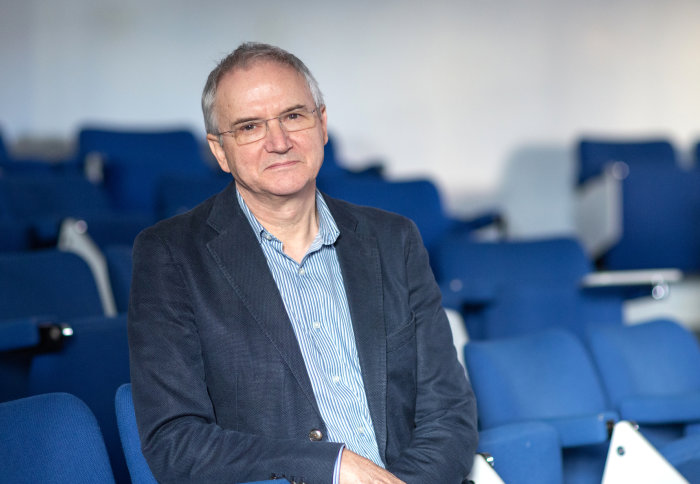Professor Peter Openshaw elected as Senior Consul at Imperial

Professor Peter Openshaw has been elected as Senior Consul having served as Clinical Consul for the Faculty of Medicine for three years.
College Consuls are elected into post by fellow senior academics and are required to act as a spokesperson for academic opinion, with a view to complement that coming through the management structure.
"Young scientists starting to build their careers at Imperial are especially fantastic individuals. Finding ways to help them (and to ensure that they stay) is enormously rewarding" Prof Peter Openshaw
There are two elected College Consuls for each of the Faculties of Engineering, Natural Sciences and Medicine. One of the Faculty of Medicine College Consuls will be a clinical Professor, with the other being a non-clinical Professor. So, in any one year there will normally be seven College Consuls; the six elected College Consuls, and a Senior College Consul.
Professor Peter Openshaw, of the National Heart and Lung Institute, kindly provided some further insight into the role of the consuls, and the senior consul, following his recent appointment.
What is a Consul?
College Consuls are Professors who have been elected by the Senior Academics to look after the ethos of the College. They are the only members of senior management elected by a popular vote, there to represent the views of College academics outside the formal line-management structures. They have quite a wide influence in the College and report directly to the Provost.
There are six elected Consuls and one Senior Consul, chosen by the six Consuls.
What kinds of activities are the Consuls involved in?
The Consuls work across the College to support academic promotions, assuring parity and equivalence in the different Faculties. Uniquely, they have the veto on appointments and promotions if they believe there are strong reasons why it should not go ahead. They also work to enhance high quality education and student experience, and to chair disciplinary, complaint and appeals panels.
The Clinical Consul has a specific additional role in chairing the Fitness to Practice Panels. These are convened to determine how to respond to allegations that medical students are unfit to be registered with the General Medical Council (GMC). This can arise for a number of reasons including dishonesty, cheating in exams, or behaviours that might bring disrepute to the profession. These hearings can be difficult, but usually there is a clear and equitable outcome, short of disbarring a student from registration. The aim is to maintain standards and to protect the public, but also to understand and support students wherever possible.
What does your role as Senior Consul entail?
The Senior Consul represents the views of the Consuls on a number of committees, convenes regular meetings of the Consuls over a working breakfast – and (most importantly) provides croissants. I’m sure there’s more to it than that, but you can ask me again once I have settled in this autumn.
Why did you decide to put yourself forward as a Senior Consul?
I felt that after three years as Clinical Consul, I was just beginning to get the hang of it. I thought that becoming Senior Consul would enable me to get to know the rest of the College even better; with all the changes going on, it seemed a good opportunity to have a higher profile.
What aspect of the role are you looking forward to most?
There are some amazing people within Imperial, most of whom you never get to meet when focused on your own research and Departmental work. For example, it’s really exciting to hear about the geology of Jovian moons, understand what makes a good mathematician, or get an update on the latest in particle physics.
Young scientists starting to build their careers at Imperial are especially fantastic individuals. Finding ways to help them (and to ensure that they stay) is enormously rewarding. Also, we know it’s not easy being a student at Imperial; although it’s one of the best places in the world to study STEM subjects, there are many challenges to living in London, being amongst a very competitive group of peers and yet remaining sane. The Consuls always have an eye on how to make the experience of being at Imperial even better, for students and staff alike.
What do you think will be the greatest challenge in the role?
For me, the mountain of paperwork and the number of new people I have to meet – and trying to remember people’s names. I like to read things carefully and have time to think, which will hardly be possible given the number of committees I’m going to be sitting on. I will just have to do my best.
The other Consuls are really great people, and I’m so thankful to them for letting me take a shot at the Senior Consul role.
Article text (excluding photos or graphics) © Imperial College London.
Photos and graphics subject to third party copyright used with permission or © Imperial College London.
Reporter
Ms Helen Johnson
Communications Division